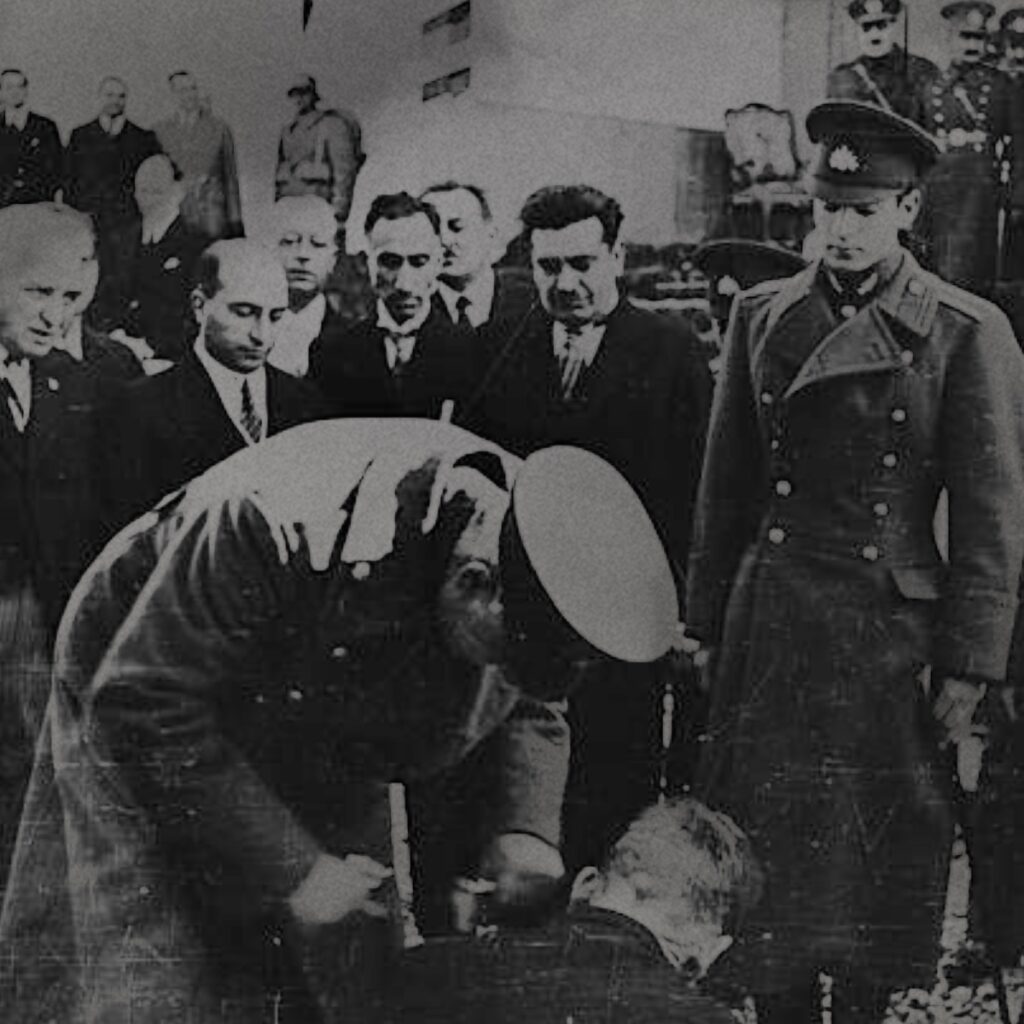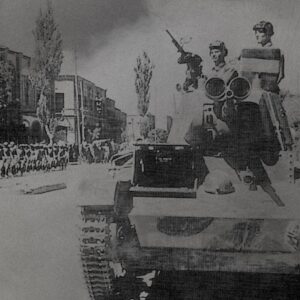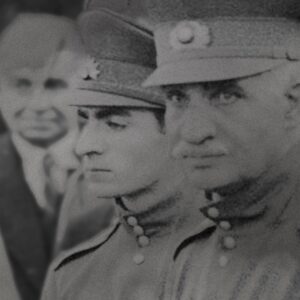This is the transcript for Book Two, episode 10 of The Lion and the Sun podcast: Reza Shah’s Abdication. When The British and the Soviets invade Iran, the Pahlavi dynasty faces the biggest threat to its existence and Reza Shah is forced to abdicate his throne.
Listen to this episode on Apple Podcasts, Spotify or all other podcast platforms.
Rajab Ali Mansour was a bureaucrat. Seasoned, discreet, and deeply entrenched in the machinery of state. He had served under the Qajars before the Pahlavi dynasty even existed. Governor of Khorasan. Ambassador to Italy. Minister of Roads and Railroads.
He was one of the men who turned the vision of the Trans-Iranian Railway into steel and motion.

Reza Shah had little patience for ambitious politicians. What he wanted were loyal administrators, men who would carry out orders, not question them. Mansour was exactly that: capable, obedient, and safe. That’s what kept him around longer than most.
His appointment as prime minister was not a result of public acclaim or parliamentary vote. It was the Shah’s choice—purely a matter of trust and utility.
Mansour was an early riser.
He liked to be ahead of the day’s crises before they arrived at his desk.
The Morning Iran Was Invaded: When the War Came to Reza Shah’s Doorstep
August 25, 1941, was no different.
At least, not at first.
In the early hours of dawn, Mansour was already awake, preparing to head to the government building.
Then came a knock at the door.
Who would be visiting at this hour?
He opened it—and froze. Standing before him were two familiar faces: Reader Bullard, the British ambassador, and Andrey Smirnov, ambassador of the Soviet Union.
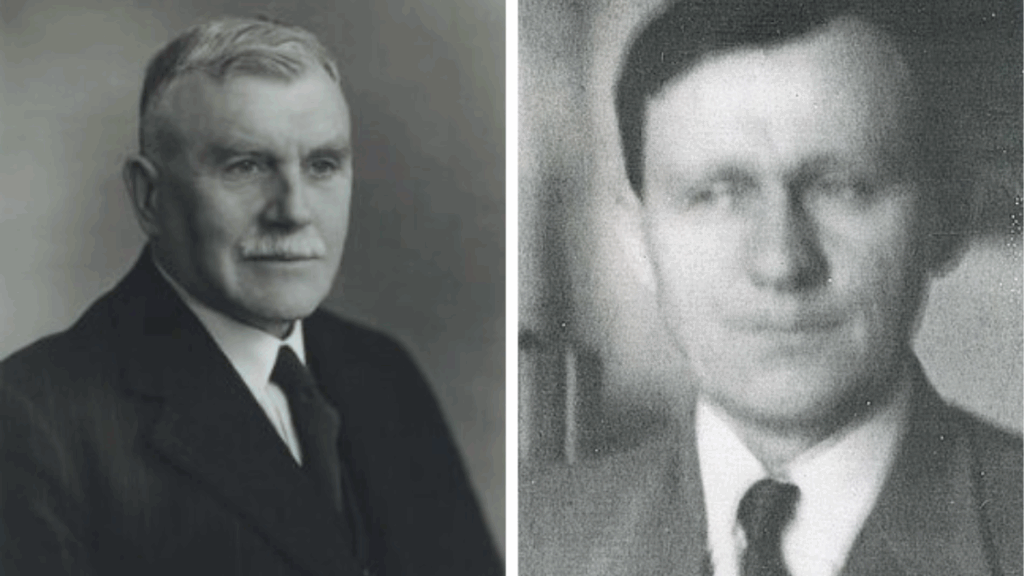
Seeing either of them unannounced was rare. Seeing both, together, at the doorstep of the prime minister, before the sun had even risen, was something else entirely.
They didn’t stay long. No time for pleasantries.
They were there to hand him a letter.
Mansour read it once.
That was enough.
He rushed out, got into his car, and ordered the driver to head straight to the Sa’d abad Palace … the residence of the king.

At the gates, the guards told him His Majesty was still asleep.
But Mansour didn’t wait.
He demanded they wake the king. Immediately.
And when he finally stood before Reza Shah, he didn’t waste a second telling him the news:
Iran was under attack.
The British and the Soviets had launched a full-scale invasion into the country.
Inside the Anglo-Soviet Invasion of Iran: How the Allies Broke Through
The Anglo-Soviet invasion of Iran wasn’t just an invasion.
It was an all-out war, on every front.
Swift. Coordinated. Brutal.
At sea, the British struck the Persian Gulf while the Red Army pushed through the Caspian.
Iran’s naval forces didn’t stand a chance. Within hours, the fleet was gone—bombed, burning, or sunk beneath the waves.
From the sky, the attacks were just as ruthless.
The Royal Air Force bombed Tehran and Qazvin, targeting military bases and communication lines, trying to force a quick surrender. At the same time, Soviet bombers hit airfields in Tabriz, Ardabil, and Rasht, wiping out Iran’s aging air fleet before it could leave the ground.
Towns were shelled. Iranian defences shattered.
The skies belonged to the Allies now, and that meant the roads ahead were open.
Then came the ground invasion.
British and Indian troops swept in from Iraq, seizing Khorramshahr, Ahvaz and all the Iranian cities with little resistance. To the north, Soviet forces flooded into Azerbaijan and the surrounding provinces, tightening their grip by the hour.

It was clear from the start:
Iran couldn’t win this war.
Why Iran’s Military Collapsed So Quickly After Invasion?
Reza Shah had devoted his entire life to growing and strengthening Iran’s military, but what he had built was a force designed for a different kind of war:
A force trained to suppress internal dissent, settle tribal disputes, and handle minor international standoffs. Not a military ready to face two global superpowers on multiple fronts.

The army lacked modern equipment. It lacked proper training.
And it lacked the experience to stand its ground against the British and the Soviet
The invasion was fast. Ruthless.
Iranian forces, caught off guard and overwhelmed, fell apart in every direction.
Resistance crumbled as Allied forces advanced toward the capital.
By the afternoon of August 25 (just hours after the attack began) disaster had already taken shape. The army units in Tabriz, Gilan, Ardabil, Mashhad, and Kermanshah, All key strongholds, had collapsed.
Enemy troops were marching toward Tehran.
And time was running out.
Reza Shah Appeals to Roosevelt and The United States
After putting the capital forces on full alert, Reza Shah decided to reach outside of his network to find some help.
The best hope, it seemed, was the United States.
Still not fully engaged in the war, yet allied with both the British and the Soviets.
If anyone had the leverage to stop the campaign … it was them.
In an emergency telegram to Franklin D. Roosevelt, Reza Shah pleaded with the American president to intervene. To halt the invasion, broker peace, and to buy time.
But the reply was swift and cold.
The United States stated plainly that they stood in agreement with their Allies.
And they would not intervene.
Iran’s final chance for de-escalation had failed.
Mansour, the prime minister, watched the collapse unfold in real time.
Unable to stop the flood, unwilling to carry the blame. He submitted his resignation to the king and stepped away from the wreckage.
When the People Turned on Reza Shah: Domestic Fallout of the Invasion
Throughout history, foreign invasion has often done what nothing else could: unite a nation. Bringing people from all walks of life together against a common enemy.
When facing an existential danger, people tend to put aside their different ideologies, political alignments and personal issues and come together under their national identity. Even during the First World War, the proxy battles fought on Iranian soil had turned the Russians and British into public enemy number one.
But this time was different.
The Anglo-Soviet invasion of Iran did unite Iranians, but not against the invaders.
It united them against their own king.
The attack unleashed the fury of the people, and it landed squarely on Reza Shah’s doorstep. Suddenly, the iron grip of his rule seemed to slip. The military, the secret police, and the surveillance networks were all consumed with the invasion.
Reza Shah was in no position to punish dissent.
For the first time, people found themselves unleashed.
Politicians, parliament members, and journalists began to voice their honest opinions about the monarchy and even celebrate its downfall.
How Reza Shah’s Authoritarian Rule Came Back to Haunt Him
The shah had spent the last decade rebuilding Iran: reforming its finances, revamping its cities, and reconnecting its provinces. But none of that could cover the cracks.
Corruption.
Cruelty.
Autocracy.
These were the real signatures of his reign.
It seemed that years of ruling with an iron fist, undermining the religion people held sacred, imprisoning and executing anyone who dared to oppose, dismantling the democracy they had fought so hard to obtain, had finally caught up with the king.
And if the Pahlavi dynasty were to vanish in the fog of war, it seemed no one would be there to mourn it.
Now, the king was truly alone.
Reza Shah Faces the Collapse of His Empire
The night of the attack, Reza Shah walked the halls of Sa’dabad Palace.
For the first time, he felt the weight of his decisions.
The man who never doubted his actions now stood paralyzed—by uncertainty, by the war, by the fate of his country.

When he became king, Iran was a country lost in the past. Undeveloped. Left behind.
He had given everything to it: his time, his strength, his vision.
He built roads, factories, schools. Raised an army. Declared independence from foreign hands. Dragged the country into the 20th century, step by step.
And what did he get in return?
A nation left in ruins by war.
Foreign powers who plotted his removal without hesitation.
And a people who cheered his downfall.
“Teymourtash would’ve known what to do,”
he thought.
“Firuz could’ve prevented this.”
“Davar knew how to negotiate.”
But they were all gone.
He was alone.
He wandered the vast halls of Sa’dabad Palace all night. Like a ghost without purpose.
The palace, once the heart of a mighty dynasty, now stood as a reminder of how fast things could change.
How fast empires could fall.
But then … as the first light of dawn crept through the palace windows… a thought emerged.
He wasn’t completely alone.
There was still one left.
The only person who could save his legacy.
Reza Shah’s Only Hope: A Forgotten Statesman in Exile
There was a knock on the door.
The old man walked slowly, feeling his way through the house.
He knew every corner. He’d been imprisoned there for half a decade.
The day was sunny. The neighbourhood quiet.
Hard to believe that just a few cities away, a world war was raging.
Even harder to imagine the country was teetering on the edge of total occupation.
The man was born into a literary household, so naturally, he spent his retirement reading and writing.
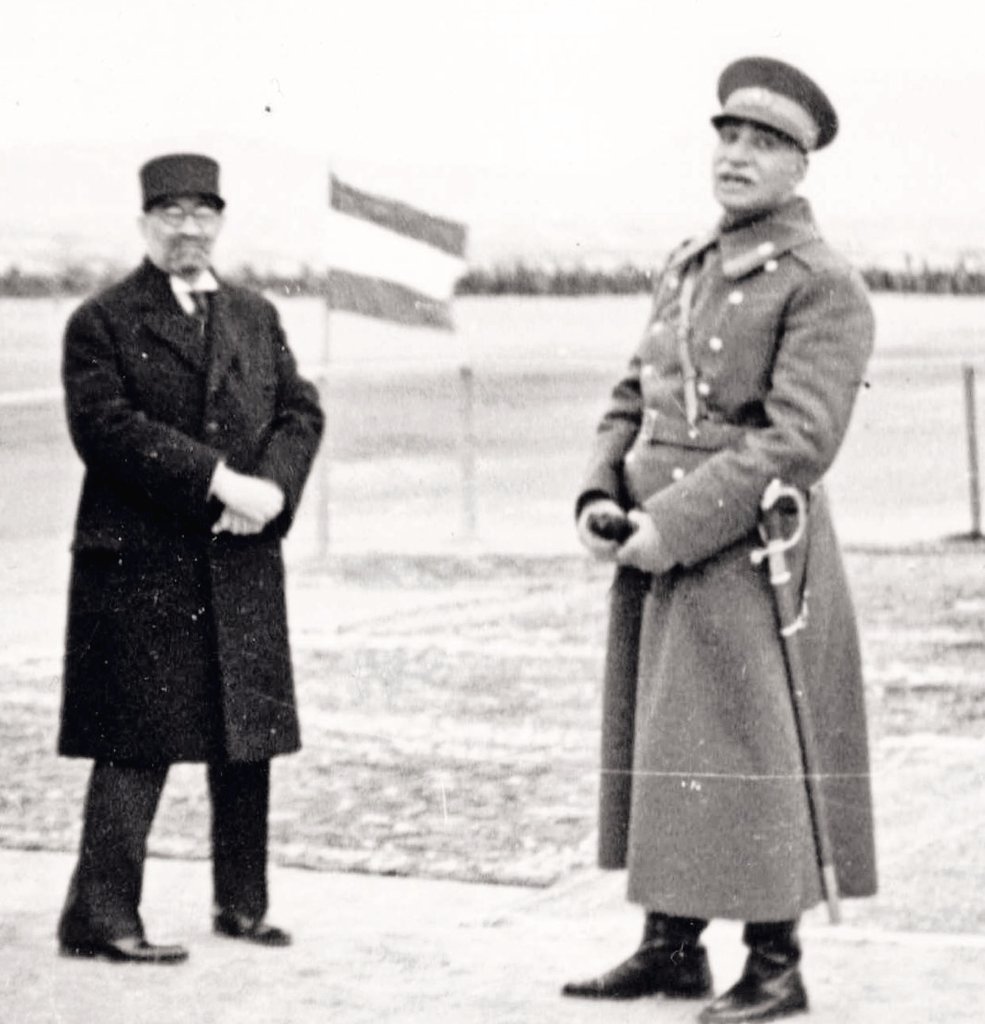
He had walked into the Majlis at the height of the Constitutional Movement, becoming its speaker before he was even thirty-five.
He had held the reins of both justice and finance, crafting reforms that would outlive dynasties, had stood before the League of Nations, speaking for Iran when few others could, he had even been the chair of the international chamber.
The last prime minister of the Qajar era, and the first of the Pahlavis.
On the day of the coronation, he rode in the second carriage, just behind the king himself.
But even he couldn’t escape the wrath that came with Reza Shah’s growing paranoia.
Although he was one of the lucky ones. His life was spared, but he was sentenced to spend the rest of it under house arrest.
Forgotten. Until now.
Mohammad Ali Foroughi’s Unexpected Comeback
The old man passed through his garden and opened the door.
He couldn’t believe what he saw.
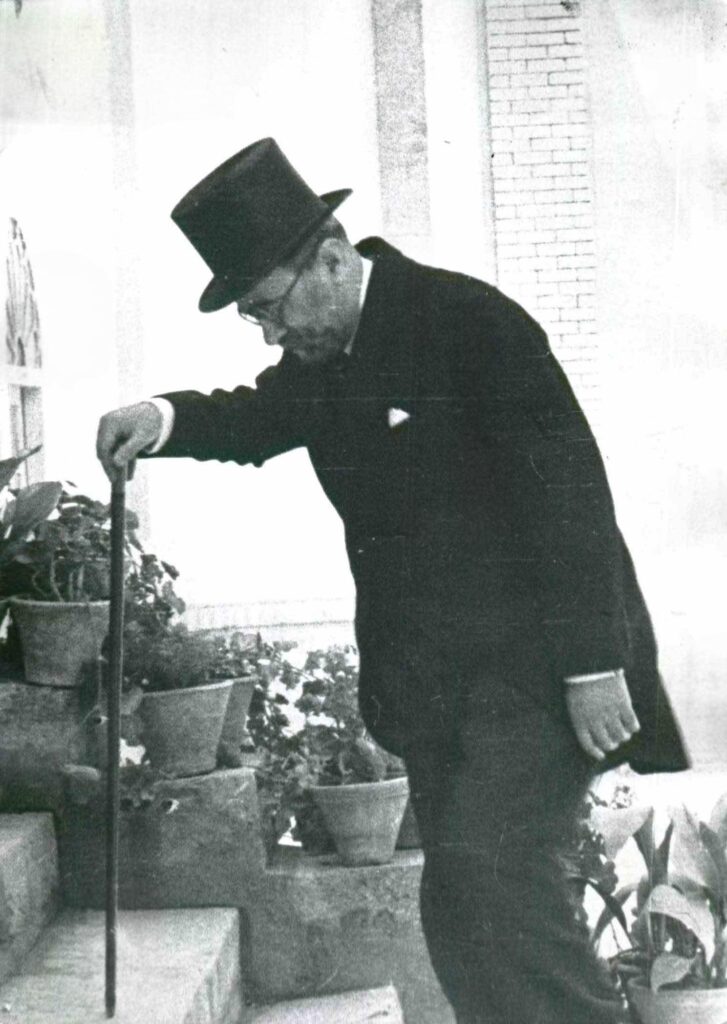
“The years seem to have treated you well, old friend.”
Mohammad Ali Foroughi didn’t answer.
He stood there, shocked.
Was this real?
There he was, Reza Shah himself. The same uniform. The same boots he’d worn the day of the coronation.
Foroughi remembered it well. He was standing next to the king that day.
The man who had removed him from power and confined him to his own home. The man who had taken everything away from him. Now, at his door.
Asking for his help. One last time.
Foroughi knew he owed the Shah nothing.
He had already given the dynasty his entire life.
But deep down, he was always a man of honour and when his country came calling at his doorstep, he would not turn away.
On August 27, Foroughi, once again, became Prime Minister of Iran, this time with the most important mandate of his life:
To save his country from total destruction.
Foroughi’s Mission: Save Iran From Total Destruction
His first action was to open a line of communication with the British and the Soviets.
He knew Iran’s military was in no position to resist. Fighting was not just futile, it was suicidal.
Foroughi had always opposed Iran’s flirtation with Germany. He had warned that getting too close would cost the country everything.
No one listened.
Now, he was the one left to clean up the mess.
Soon after Parliament gave a vote of confidence to his cabinet, Foroughi invited the envoys of the two invading powers to his home. He still had credit with the ambassadors from his League of Nations days, so both Bullard and Smirnov accepted the invitation.
Foroughi Tries to Negotiate Peace, The Allies Demand Reza Shah’s Removal
In that meeting, Foroughi attempted to find common ground, but Bullard, the British ambassador, delivered the message plainly:
His government was no longer willing to work with Reza Shah.
They wanted Reza Shah’s abdication.
For Foroughi, it felt like déjà vu. More than a decade earlier, he had heard those very same words from Reza Khan himself. Back then, the message had been about removing the Qajar dynasty. Now, it was Reza Shah who stood at the edge of history’s blade.
Foroughi promised that Iran was ready to negotiate and followed the meeting with a formal armistice request to both embassies. He thought that the good-faith meeting might convince the countries to temporarily stop the attacks while the negotiations continued. But the bombs didn’t stop.
The Red Army treated each captured city like one of their own. Occupying, controlling, dismantling. In the south, British warplanes turned city after city to fire and ash.

The war raged on.
And the cost of Reza Shah’s defiance grew heavier by the hour.
While the two powers continued their assault (bombing cities, burning through provinces), the king, fearing for the safety of his family, made a decision.
Fear and Flight in Tehran: Reza Shah Sends His Family Away
On August 29th, he ordered his family to leave the capital and relocate to Esfahan.
He stayed behind.
Perhaps hoping for the best.
Perhaps preparing for the worst.
He also asked Mohammad Reza, the crown prince, to remain by his side.
But the move didn’t stay secret for long. Rumours spread like wildfire. People whispered that the Shah had abandoned his post and deserted his people.
The result was chaos.
Soldiers left their stations.
Politicians packed their bags. Some to flee the capital, others the country itself.
Panic gripped the streets of Tehran.
To stop the unravelling, the government declared martial law. Citizens were ordered to stay indoors. Movements were restricted.
Fear did the rest.
But behind closed doors, Foroughi and his team were busy negotiating.
Meeting after meeting with the British and the Soviets.
The British had made their demands clear:
Reza Shah’s abdication was a must.
And now, the Soviets had joined them.
But they wanted more than the removal of a man.
They wanted the dynasty itself to end.
Return of the Qajars: The Allies Demand for Change
Their initial idea was to resurrect the Qajar dynasty.
They knew the Qajars. They were complacent. Predictable. They never said no to the British or the Russians.
Britain had even gone so far as to trace one or two princes they thought would make ideal candidates for the throne.
But Foroughi rejected the idea outright.
Despite the chaos, the Qajars were still deeply unpopular among the people. Bringing them back would only reignite old resentments and deepen the public’s anger toward foreign meddling.
Then there was the other option … what Reza Shah himself had once desired.
The ideas was to end the monarchy.
To close the gates of palaces and castles for good.
To form a republic.
A new political system where Iranians could choose their own leader.
Some even whispered that Foroughi could be the first president.
But he wasn’t convinced.
It hadn’t even been twenty years since the Pahlavi dynasty was born. So much effort, so much time had gone into rebuilding the nation’s foundation. From its laws to its roads, its currency to its classrooms.
Could the country really survive another upheaval?
Were the people, who had only just begun adjusting to this new order, ready to let go of the monarchy?
No.
Foroughi had a different idea.
A third path forward.
The Compromise That Could Save the Pahlavi Dynasty
Convincing the Shah to abdicate was close to impossible. But there was one outcome that might just make him consider it.
Foroughi proposed a compromise to the ambassadors: Maybe he could persuade Reza Shah to step down … If the crown were to pass directly to his son.
He argued that Mohammad Reza was different.
In temperament. In ideology.
A softer presence. A more flexible ruler. Someone the Allies could manage.
This way, the Pahlavi state would survive. Reza Shah would step aside, but his legacy would remain.
Mohammad Reza would take the throne. The British and Soviets would get their reboot. And Iran could hold on to the fragile stability it had spent two decades building.
After long deliberation, the superpowers agreed.
They gave Foroughi a deadline:
Noon. September 17.
If Reza Shah did not abdicate by then, they would proceed with full force—Invade Tehran.
Crush the monarchy.
And end the Pahlavi dynasty for good.
Foroughi had secured one-half of the deal.
And with a ticking deadline, the harder half (convincing the Shah to surrender his crown) was still to come.
Reza Shah Agrees to Abdicate: A King’s Final Conversation
When Foroughi met Reza Shah on September 1, he wasn’t the man he had once known.
The Shah had always commanded a room. Tall, broad-shouldered, eyes sharp as blades.
His very presence made people uneasy, even when he was in a good mood.
You didn’t relax around Reza Shah. You braced yourself.
But that day… he seemed hollow. Soulless.
As if the weight of everything had finally sunk in.
He looked older. He sounded tired.
And his mind, wherever it was, was far from the palace walls.
Foroughi had expected a scolding.
The prime minister had brokered a deal with the British, after all.
He had handed the monarchy’s fate to foreign powers.
He was ready for the wrath.
But the wrath never came.
Before he could even speak, Reza Shah told him his decision.
He was stepping down.
No fight, no speeches, no defiance.
It was as if he had seen the writing on the wall and accepted it.
He had made peace with his fate.
Iran Declares War on Germany, the Shah Signs His Abdication
That very day, he gathered his closest circle.
He informed the cabinet. The news was official.

Soon after, the Foreign Ministry ordered all German nationals (troops, technicians, diplomats) to leave Iran.
“Iran hereby declares that a state of war exists between Iran and Germany, and that the Imperial Government has acceded to the Declaration of the United Nations dated January 1942.”
On September 13, Iran broke its neutrality.
In a letter sent through Switzerland, the government declared war on Germany.
And finally, on the morning of September 16, a day before the Allied deadline expired, Reza Shah Pahlavi signed his abdication.

He handed the letter to Foroughi.
And just like that, his reign was over.
The Shah Signs His Abdication: Iran Declares War on Germany
“The gathering of this noble assembly, where the heart of the Iranian nation overflows with joy, delight, and devotion, stands as a testament to unity. At this moment, all across the land, the people partake in celebration, with eager and abundant joy. Not only because a new king ascends the throne of this ancient realm and places the crown of kingship upon his head, but because the age of sorrow has ended and the tides have shifted. By God’s will, the days of hardship and suffering are now behind, and the time of pride and honour has come to dawn.”
Fifteen years had passed since those words were spoken by Foroughi at Reza Shah’s coronation.
In those fifteen years, Reza Shah had laid the groundwork for a modern, centralized Iranian state.
He expanded the national army.
Built a structured government with professional ministries and trained civil servants.
Reza Shah connected Iran’s distant cities with the largest railway in the country’s history and over 15,000 miles of road.
He pushed for industrialization and increased state revenues through taxes and oil royalties, setting the stage for state-led economic growth.
He established a nationwide school system.
Founded the University of Tehran.
Promoted women’s education and entry into the workforce.
His government codified legal systems based on European models, reduced clerical power, and standardized weights, measures, and calendars.
He revived a national identity rooted in Iran’s pre-Islamic past, funding archaeological projects and pushing back against foreign dominance by abolishing capitulations and renegotiating oil agreements.
But all of it had come at a cost.
Reza Shah’s Abdication: The King is Banished
Industrial growth brought corruption, deep and widespread.
His authoritarian grip turned the sacred Majlis into an echo chamber.
His paranoia devoured the very men who built his regime—many of them dead, vanished, or confined under house arrest.
And his relentless push for modernization had alienated the country’s religion, erasing any goodwill left among the people.
They didn’t care about railways or progress.
To them, he was just a tyrant who listened to no one, respected nothing, and saw enemies in every shadow.
Now, that rule (unshakable for so long) was collapsing.
And there was nothing he could do to stop it.
Fifteen years had passed since those words were spoken by Foroughi at Reza Shah’s coronation.
And now, he was standing by the king’s side one final time—
Receiving his abdication letter.
Watching him prepare to leave Iran forever.
But his job wasn’t done yet.
Before leaving the palace, Reza Shah took Foroughi’s hands.
There was something he needed to ask.
“The crown has to go to my son. He’s the heir.”
Foroughi nodded. He said he’d do his best.
But Reza Shah didn’t let go.
“Promise me, friend.”
“Promise me!”
And with that, he turned.
Got into the car.
And left.
The King of Iran was banished from his country.

Iran: A Land of Kings, A Legacy on the Line
For thousands of years, Iran has been known as the land of kings.
A realm carved by empires, ruled by men whose names echoed through the corridors of time.
From Cyrus the Great, who built the vast Achaemenid Empire, to Darius, who governed with vision and precision— Iran’s monarchs shaped one of history’s most enduring civilizations.
Brick by brick.
Lifetime by lifetime.
This lineage,Achaemenids, Parthians, Sassanids, Safavids, Did more than hold power.
They gave rulership meaning. They brought with them art, law, religious tolerance, and monumental beauty.
But they weren’t just rulers.
They were stewards of an ancient tradition. Defenders of identity. And symbols of continuity through centuries of change.
The protectors of the lion and the sun.
Mohammad Reza Pahlavi Takes the Throne
And on September 16, as Reza Shah’s chapter came to a close,
Another name was etched onto that ancient scroll of kings.
At 4 p.m. that day, Foroughi took the young heir to the Majlis.
In front of the assembled parliamentarians, the room heavy with silence and history, he placed his hand on the Quran.

With eyes fixed forward and the weight of a dynasty on his shoulders,
he took the oath … and was sworn in as the next monarch of Iran.
Mohammad Reza Pahlavi.
First of his name.
Second king of Pahlavi.
Last Shah of Iran.

